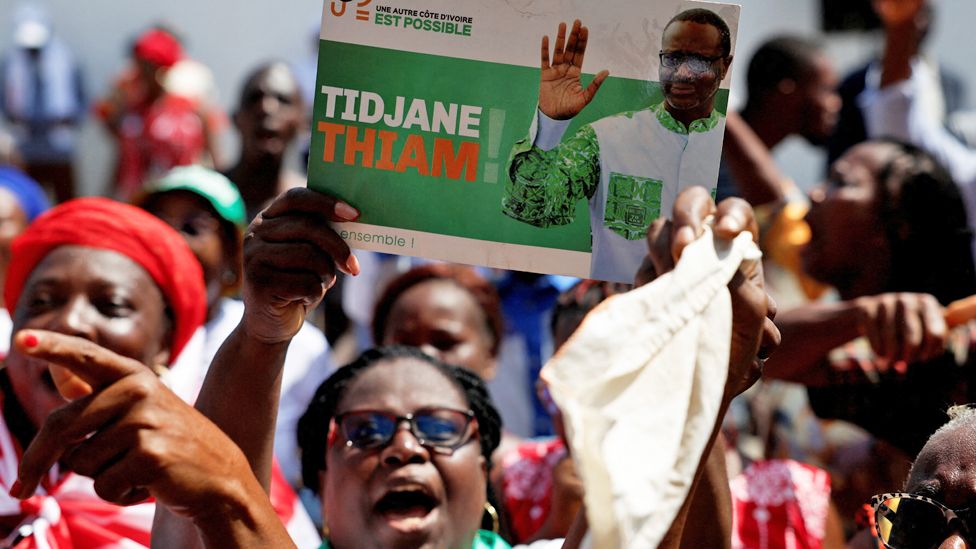Challenges Facing Ivory Coast’s Democratic Landscape Following Tidjane Thiam’s Citizenship Setback
In Ivory Coast, a rigorous political landscape poses significant challenges, even to those with illustrious international careers. Tidjane Thiam, a prominent banking executive, is currently navigating the turbulent waters of Ivorian politics as he attempts to secure a presidential bid amidst questions surrounding his citizenship, a situation that has sparked wider concerns about democratic integrity in the nation.
Thiam, who recently returned to Ivory Coast after a successful career overseas, saw his ambitions come to a halt following a court ruling on April 22, which determined that he had lost his citizenship after acquiring French nationality decades prior. This decision has left his presidential aspirations in jeopardy, raising concerns about the current political climate as the nation heads toward elections in October.
Thiam’s Political Journey
Returning to his native land in 2022 after years in the finance sector, Thiam was greeted as a strong candidate to replace the aging President Alassane Ouattara, who is in his final term. With a lineage connected to Ivory Coast’s founding president, Thiam’s credentials seemed solid; he had previously held significant government roles in the 1990s and was seen as a progressive figure capable of offering a fresh leadership style.
After the passing of longstanding opposition leader Henri Konan Bédié in 2023, Thiam was appointed as the Democratic Party of Ivory Coast’s (PDCI) candidate. However, his eligibility to compete in the upcoming election has become a contentious issue, especially with Ouattara potentially considering a fourth term with the backing of the ruling party, the Rally of Houphouëtists for Democracy and Peace (RHDP).
Judicial Rulings and Political Implications
The April court decision regarding Thiam’s nationality bars him from participating in the presidential race, which is further complicated by existing legal frameworks that disqualify other notable opposition figures. This legal landscape could allow the ruling party to face minimal competition in the election, potentially exacerbating disillusionment among the Ivorian electorate.
Such sentiments are common, especially in regions where military coups have garnered popular support due to a growing disenchantment with political establishments. With a significant percentage of the population under the age of 35, the potential for unrest remains a concern as young people seek genuine representation and reform within the political system.
The Broader Context
Despite the challenges, there have been recent hopeful moments regarding democratic processes in West Africa. Countries like Liberia and Senegal have managed to transition power peacefully, igniting optimism in locations like Ivory Coast. This setting is particularly relevant as it is a key player within the Economic Community of West African States (ECOWAS) and an economic powerhouse in the CFA franc zone.
Nevertheless, the unfortunate recurrence of identity politics poses risks reminiscent of the turmoil experienced in the previous decades. Courts have played a significant role in determining who is deemed fit for political office, leading to a situation where citizenship—and its interpretation—becomes a political weapon.
Potential Outcomes for Thiam’s Candidacy
As discussions continue regarding Thiam’s eligibility, both judicial and popular pressures may influence outcomes leading up to the election. Possibilities remain that political negotiations could pave the way for Thiam’s candidacy to be reinstated, especially if Ouattara decides not to run, which could help maintain political stability.
Current Citizenship Context
Ivory Coast’s complex citizenship laws have significant implications for its political landscape. The situation highlights the issues surrounding national identity and the impact of past citizenship laws that have historically marginalized candidates based on ethnicity and origin. As Thiam and his team await the next court ruling, the broader implications for Ivorian democracy loom large.
| Candidate | Political Affiliation | Current Status |
|---|---|---|
| Tidjane Thiam | Democratic Party of Ivory Coast (PDCI) | Citizen eligibility under dispute |
| Alassane Ouattara | RHDP | Incumbent, potential candidate for re-election |
| Laurent Gbagbo | Opposition | Excluded due to past court rulings |
In summary, the predicament faced by Thiam could serve as a bellwether for the future of democracy in Ivory Coast, where the intersection of law, identity, and politics remain critical in shaping the country’s trajectory.


